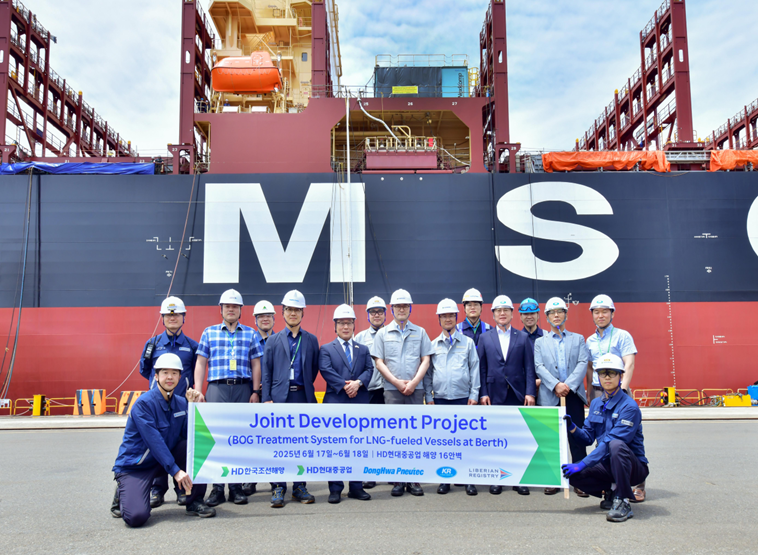-
- KR Marks 65th Anniversary with Industry Forum Calling for a Korean Maritime Cluster
- KR Expands Technical Collaboration at Nor-Shipping 2025
- KR Releases 10th Issue of KR Decarbonization Magazine
- KR and HD Hyundai Samho Join Forces to Bring AI into Ship Design
- KR Teams Up with Leading Shipbuilders and KTR to Develop International Standards for Ammonia Effluent Discharge
- KR-Team Korea Holds First Wing Sail Demonstration to Advance Green Shipping
- KR and HD Hyundai Pioneer BOG Reuse System for LNG-Fueled Vessel at Berth
- KR Grants AIP to HD HHI for Innovative CHS of Membrane Ammonia Tank
- KR Chairs 54th TSCF Meeting Reinforcing Global Collaboration on Tanker Safety
-
- MEPC 83 - News Final
- MSC110 - News Flash
- Revision of " Guidelines for Ships carrying Liquefied Hydrogen in Bulk"
- Establishment of the “Guidelines for Approval of Metallic Materials in Hydrogen Service”
- [2025-IMO-08] FAQ on IMO GHG Reduction Measures
- Notification of LNG Bunkering Guidelines Issued by Directorate General of Shipping, India
- KR Marks 65th Anniversary with Industry Forum Calling for a Korean Maritime Cluster
- KR Expands Technical Collaboration at Nor-Shipping 2025
- KR Releases 10th Issue of KR Decarbonization Magazine
- KR and HD Hyundai Samho Join Forces to Bring AI into Ship Design
- KR Teams Up with Leading Shipbuilders and KTR to Develop International Standards for Ammonia Effluent Discharge
- KR-Team Korea Holds First Wing Sail Demonstration to Advance Green Shipping
- KR and HD Hyundai Pioneer BOG Reuse System for LNG-Fueled Vessel at Berth
- KR Grants AIP to HD HHI for Innovative CHS of Membrane Ammonia Tank
- KR Chairs 54th TSCF Meeting Reinforcing Global Collaboration on Tanker Safety
- MEPC 83 - News Final
- MSC110 - News Flash
- Revision of " Guidelines for Ships carrying Liquefied Hydrogen in Bulk"
- Establishment of the “Guidelines for Approval of Metallic Materials in Hydrogen Service”
- [2025-IMO-08] FAQ on IMO GHG Reduction Measures
- Notification of LNG Bunkering Guidelines Issued by Directorate General of Shipping, India
-
- KR Marks 65th Anniversary with Industry Forum Calling for a Korean Maritime Cluster
- KR Expands Technical Collaboration at Nor-Shipping 2025
- KR Releases 10th Issue of KR Decarbonization Magazine
- KR and HD Hyundai Samho Join Forces to Bring AI into Ship Design
- KR Teams Up with Leading Shipbuilders and KTR to Develop International Standards for Ammonia Effluent Discharge
- KR-Team Korea Holds First Wing Sail Demonstration to Advance Green Shipping
- KR and HD Hyundai Pioneer BOG Reuse System for LNG-Fueled Vessel at Berth
- KR Grants AIP to HD HHI for Innovative CHS of Membrane Ammonia Tank
- KR Chairs 54th TSCF Meeting Reinforcing Global Collaboration on Tanker Safety
-
- MEPC 83 - News Final
- MSC110 - News Flash
- Revision of " Guidelines for Ships carrying Liquefied Hydrogen in Bulk"
- Establishment of the “Guidelines for Approval of Metallic Materials in Hydrogen Service”
- [2025-IMO-08] FAQ on IMO GHG Reduction Measures
- Notification of LNG Bunkering Guidelines Issued by Directorate General of Shipping, India
Korean Register (KR) and HD Hyundai have successfully completed the world’s first demonstration of a technology that recycles boil-off gas (BOG) from an LNG-fueled vessel under construction into city gas. The breakthrough offers a practical solution to reduce greenhouse gas (GHG) emissions and comply with increasingly stringent port regulations.
The trial was conducted at HD Hyundai Heavy Industries in Ulsan with participation from HD Korea Shipbuilding & Offshore Engineering (HD KSOE), HD Hyundai Heavy Industries (HD HHI), Donghwa Entec, KR, and the Liberian Registry (LISCR). The test was carried out during the construction of an LNG dual-fuel container ship.
This joint project was initiated in March 2025, when HD KSOE proposed the concept of recycling BOG into city gas during the shipbuilding process as a means to reduce GHG emissions. HD Hyundai Heavy Industries and Donghwa Entec co-developed the necessary BOG handling equipment, while KR and the LISCR reviewed and verified the system from design and manufacturing to operation.
LNG in cryogenic fuel tanks naturally evaporates, creating BOG that raises internal pressure. While BOG can be used as fuel during ship operation, it is typically flared or vented when the vessel is at berth or under construction, leading to environmental and regulatory challenges.
With the recent trend toward mandatory use of Alternative Maritime Power (AMP) systems during port stays, even gas flaring is being restricted, highlighting the urgent need for alternative BOG management solutions.
The newly demonstrated technology enables the recovery and reuse of more than 50 tons of BOG per vessel during the construction phase, transforming it into city gas for onshore use. The system not only reduces emissions but also supports compliance with shore-based environmental regulations related to AMP, offering long-term value for shipyards and shipowners.
YEON Kyujin, Head of Plan Approval Center at KR, stated,
“This is a meaningful case of technological innovation to reduce GHG emissions during the construction and port-stay phases of LNG-fueled vessels. KR remains committed to supporting the decarbonization of shipbuilding and shipping through technical support and thorough verification.”

